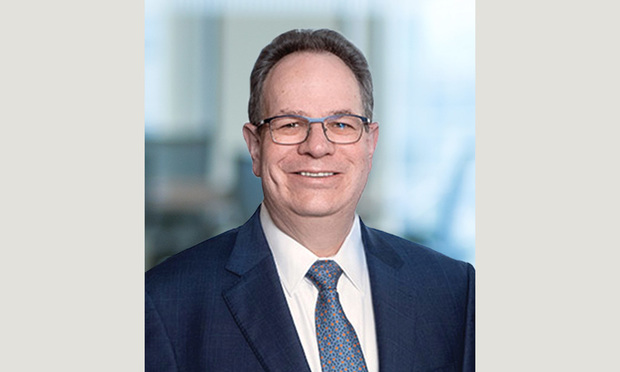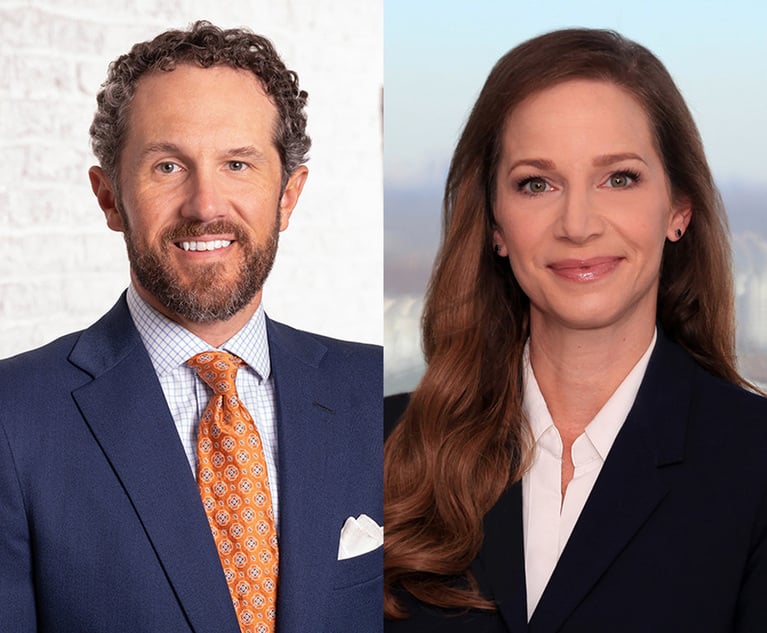Small-Business Owners Are Anxious Despite Federal Aid: A Q&A With Munsch Hardt's David Roth
Texas Lawyer recently spoke with David Roth, a shareholder with Munsch Hardt Kopf & Harr, about the CARES Act and what small-business owners need to know about the program.
July 09, 2020 at 07:49 PM
4 minute read
 David R. Roth, shareholder with Munsch Hardt Kopf & Harr.
David R. Roth, shareholder with Munsch Hardt Kopf & Harr.
The Coronavirus Aid, Relief, and Economic Security (CARES) Act allocated $350 billion to help small businesses keep workers employed amid the pandemic and economic downturn. Despite full loan forgiveness for self-employed borrowers, many are now questioning whether they can survive the storm.
With ongoing uncertainties about the application process itself, many borrowers are frustrated and worried about their status, says David R. Roth, a shareholder with Munsch Hardt Kopf & Harr.
Texas Lawyer recently spoke with Roth about the CARES Act and what small-business owners need to know about the program.
After a rough start, how is the CARES Act doing now?
David R. Roth: The total authorized by Congress is now $650 billion, after the first $350 billion quickly ran out. However, applications slowed down after the second allocation of $300 billion was approved. I believe that was largely caused by signals from the SBA and the Treasury Department that borrowers would be carefully scrutinized, and their "need" for a PPP Loan would be subject to criticism and second-guessing. Subsequently, the SBA tried to calm borrowers with less aggressive guidance. And Congress passed the PPPFA, easing requirements on borrowers significantly. In any event, the original deadline for applications passed on June 30, with $129 billion still available and unborrowed. Last Sunday, July 5, the application deadline was extended until Aug. 8.
Can you tell me about the kinds of people who are at risk?
After some bad publicity early on, the SBA seems focused on larger borrowers who receive loans for more than $2 million, and who appear to have ready access to other funding. At first, the guidance focused on public companies, and later the SBA clarified that private companies with easy access to other funding should be concerned, as well. Beyond that, most borrowers who had good-faith reasons to be uncertain about their financial futures, and used the money to preserve jobs should be fine.
What steps should self-employed borrowers be taking?
The SBA has made several efforts to reduce the burden on self-employed borrowers. After some confusing early guidance that left self-employed borrowers uncertain about whether they could qualify at all, the SBA has made it clear that self-employed borrowers who can document past income can borrow under the program. There is also an "easy" form issued by the SBA especially for self-employed individuals, independent contractors, or sole proprietors who had no employees at the time of the PPP loan application to seek loan forgiveness. Assuming they had qualifying 2019 income, these borrowers can seek forgiveness for up to $20,833 in payroll expenses.
Where can they get more information about the CARES Act and are there any alternative federal or state programs that help self-employed borrowers?
The best source of information is the SBA website. Our law firm, Munsch Hardt, has also published several helpful analysis documents on our website. There are also state, county and local programs that seek to help very small borrowers, but many of these quickly ran out of funds.
Why should they take advantage of these programs when the economy is slow to reopen?
All qualifying businesses should take advantage of these programs, especially if the economy is slower to reopen. Under amendments to the CARES Act, borrowers can now use these funds over a 24-week period, and still seek forgiveness of their loans. The underlying purpose of the CARES Act programs is to keep as many people employed for as long as possible.
How long will these programs last?
The deadline for applications is Aug. 8, 2020, and the funds must be used by Dec. 31, 2020.
What other advice can you give?
Make sure you are talking with your accounting, tax and legal advisors and sharing information with them regarding the challenges your business faces. In addition to the direct assistance programs, there are tax deferrals and other relief available. We're all in this together, and want your business to survive and flourish when this pandemic ends.
David R. Roth is a shareholder at Munsch Hardt Kopf & Harr's Houston office. He provides trusted counsel to the firm's corporate and securities and finance practice groups. Roth can be reached via email at [email protected].
This content has been archived. It is available through our partners, LexisNexis® and Bloomberg Law.
To view this content, please continue to their sites.
Not a Lexis Subscriber?
Subscribe Now
Not a Bloomberg Law Subscriber?
Subscribe Now
NOT FOR REPRINT
© 2025 ALM Global, LLC, All Rights Reserved. Request academic re-use from www.copyright.com. All other uses, submit a request to [email protected]. For more information visit Asset & Logo Licensing.
You Might Like
View All
Special Counsel Jack Smith Prepares Final Report as Trump Opposes Its Release
4 minute read
'Serious Disruptions'?: Federal Courts Brace for Government Shutdown Threat
3 minute read
Government Attorneys Are Flooding the Job Market, But Is There Room in Big Law?
4 minute read
Overtime Rewind: Texas Court Ruling Unravels FLSA Salary Level Increases
4 minute readLaw Firms Mentioned
Trending Stories
- 1Meta Pulls Plug on DEI Programs
- 2On the Move and After Hours: Meyner and Landis; Cooper Levenson; Ogletree Deakins; Saiber
- 3State Budget Proposal Includes More Money for Courts—for Now
- 4$5 Million Settlement Reached With Stone Academy
- 5$15K Family Vacation Turned 'Colossal Nightmare': Lawsuit Filed Against Vail Ski Resorts
Who Got The Work
Michael G. Bongiorno, Andrew Scott Dulberg and Elizabeth E. Driscoll from Wilmer Cutler Pickering Hale and Dorr have stepped in to represent Symbotic Inc., an A.I.-enabled technology platform that focuses on increasing supply chain efficiency, and other defendants in a pending shareholder derivative lawsuit. The case, filed Oct. 2 in Massachusetts District Court by the Brown Law Firm on behalf of Stephen Austen, accuses certain officers and directors of misleading investors in regard to Symbotic's potential for margin growth by failing to disclose that the company was not equipped to timely deploy its systems or manage expenses through project delays. The case, assigned to U.S. District Judge Nathaniel M. Gorton, is 1:24-cv-12522, Austen v. Cohen et al.
Who Got The Work
Edmund Polubinski and Marie Killmond of Davis Polk & Wardwell have entered appearances for data platform software development company MongoDB and other defendants in a pending shareholder derivative lawsuit. The action, filed Oct. 7 in New York Southern District Court by the Brown Law Firm, accuses the company's directors and/or officers of falsely expressing confidence in the company’s restructuring of its sales incentive plan and downplaying the severity of decreases in its upfront commitments. The case is 1:24-cv-07594, Roy v. Ittycheria et al.
Who Got The Work
Amy O. Bruchs and Kurt F. Ellison of Michael Best & Friedrich have entered appearances for Epic Systems Corp. in a pending employment discrimination lawsuit. The suit was filed Sept. 7 in Wisconsin Western District Court by Levine Eisberner LLC and Siri & Glimstad on behalf of a project manager who claims that he was wrongfully terminated after applying for a religious exemption to the defendant's COVID-19 vaccine mandate. The case, assigned to U.S. Magistrate Judge Anita Marie Boor, is 3:24-cv-00630, Secker, Nathan v. Epic Systems Corporation.
Who Got The Work
David X. Sullivan, Thomas J. Finn and Gregory A. Hall from McCarter & English have entered appearances for Sunrun Installation Services in a pending civil rights lawsuit. The complaint was filed Sept. 4 in Connecticut District Court by attorney Robert M. Berke on behalf of former employee George Edward Steins, who was arrested and charged with employing an unregistered home improvement salesperson. The complaint alleges that had Sunrun informed the Connecticut Department of Consumer Protection that the plaintiff's employment had ended in 2017 and that he no longer held Sunrun's home improvement contractor license, he would not have been hit with charges, which were dismissed in May 2024. The case, assigned to U.S. District Judge Jeffrey A. Meyer, is 3:24-cv-01423, Steins v. Sunrun, Inc. et al.
Who Got The Work
Greenberg Traurig shareholder Joshua L. Raskin has entered an appearance for boohoo.com UK Ltd. in a pending patent infringement lawsuit. The suit, filed Sept. 3 in Texas Eastern District Court by Rozier Hardt McDonough on behalf of Alto Dynamics, asserts five patents related to an online shopping platform. The case, assigned to U.S. District Judge Rodney Gilstrap, is 2:24-cv-00719, Alto Dynamics, LLC v. boohoo.com UK Limited.
Featured Firms
Law Offices of Gary Martin Hays & Associates, P.C.
(470) 294-1674
Law Offices of Mark E. Salomone
(857) 444-6468
Smith & Hassler
(713) 739-1250






